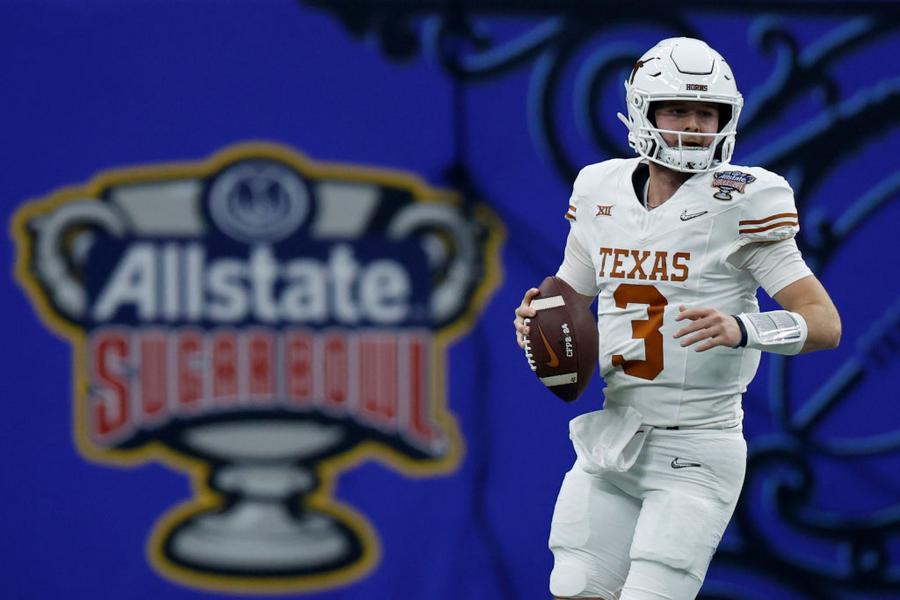Among gamers and football fans, EA Sports' College Football series has become something of a legend. The company released a new title every year from 1993 to 2013. Each game featured one or more college football superstars on the cover — such as Charles Woodson, Reggie Bush, or Tim Tebow — and fun features like a "tug-of-war" challenge and mascot games. Few things could top Otto, the Syracuse Orange, taking on the Stanford Tree.
Yet as legal disputes between the NCAA, college athletes, and EA Sports continued to grow, the company decided it wasn't worth continuing to release the annual games. EA Sports announced NCAA Football 14, with former Michigan quarterback Denard Robinson on the cover, would be the last of the series.
For a decade, anxious gamers hoped the NCAA would return to their consoles. Now that name, image, and likeness (NIL) deals are legal in college sports, they're going to get their wish — even if it costs EA millions of dollars.

Texas quarterback Quinn Ewers (Chris Graythen/Getty Images)
After an initial announcement in 2021 that the series would return, EA Sports said this February that EA Sports College Football 25 will release later this year, with more details to come in May.
Sportico also reported that EA Sports is offering a whopper of an NIL deal. Ever single scholarship athlete will make a minimum of $600. While that may not sound like a ton of money individually, there are 85 scholarship players per school across 134 teams. That's a total of 11,390 players. At $600 per player, EA Sports is paying $6,834,000 in NIL deals in order to release College Football 25. Each athlete will also get a copy of the game, and some will be "ambassadors" to promote the game on their social media channels.
That amount is believed to be the largest NIL deal ever — and it's the absolute minimum EA Sports will pay. We may also see recognizable returning superstars on some of the most successful teams receive bonuses, such as Texas quarterback Quinn Ewers or Georgia quarterback Carson Beck.
Players could choose to opt out of having their name, image, and likeness used in the game. However, that percentage will likely be miniscule, particularly for less glamourous positions like offensive linemen or special teams players.
Getting the chance to play as yourself in a video game is already a cool proposition. Receiving money for the honor, too? That's even better.
/2016/03/GettyImages-283286.jpg)
/2015/09/GettyImages-116615067.jpg)
/2022/07/GettyImages-890031338.jpg)
/2016/05/GettyImages-457320628.jpg)
/2016/08/GettyImages-504561416.jpg)
/2022/12/kylian2.jpg)
/2012/12/Lydia-Stirling-McLaughlin.jpg)
/2010/07/Kasey-Kahne.jpg)
/2019/11/Triple-H.jpg)
:strip_exif()/2020/06/taylor.png)
/2020/01/rk.png)
/2011/04/GettyImages-182088065.jpg)
/2020/01/robert-kiyosaki.png)
/2017/04/GettyImages-139515848.jpg)
/2020/02/Spike-Lee.jpg)
/2020/11/stephanie.jpg)
/2009/12/The-Undertaker.jpg)
/2019/05/Goldust.jpg)
/2017/04/Roman-Reigns-1.jpg)
/2019/10/rm.jpg)
/2011/04/CM-Punk.jpg)
/2020/05/michael-douglas.jpg)
/2014/08/sp-1.jpg)